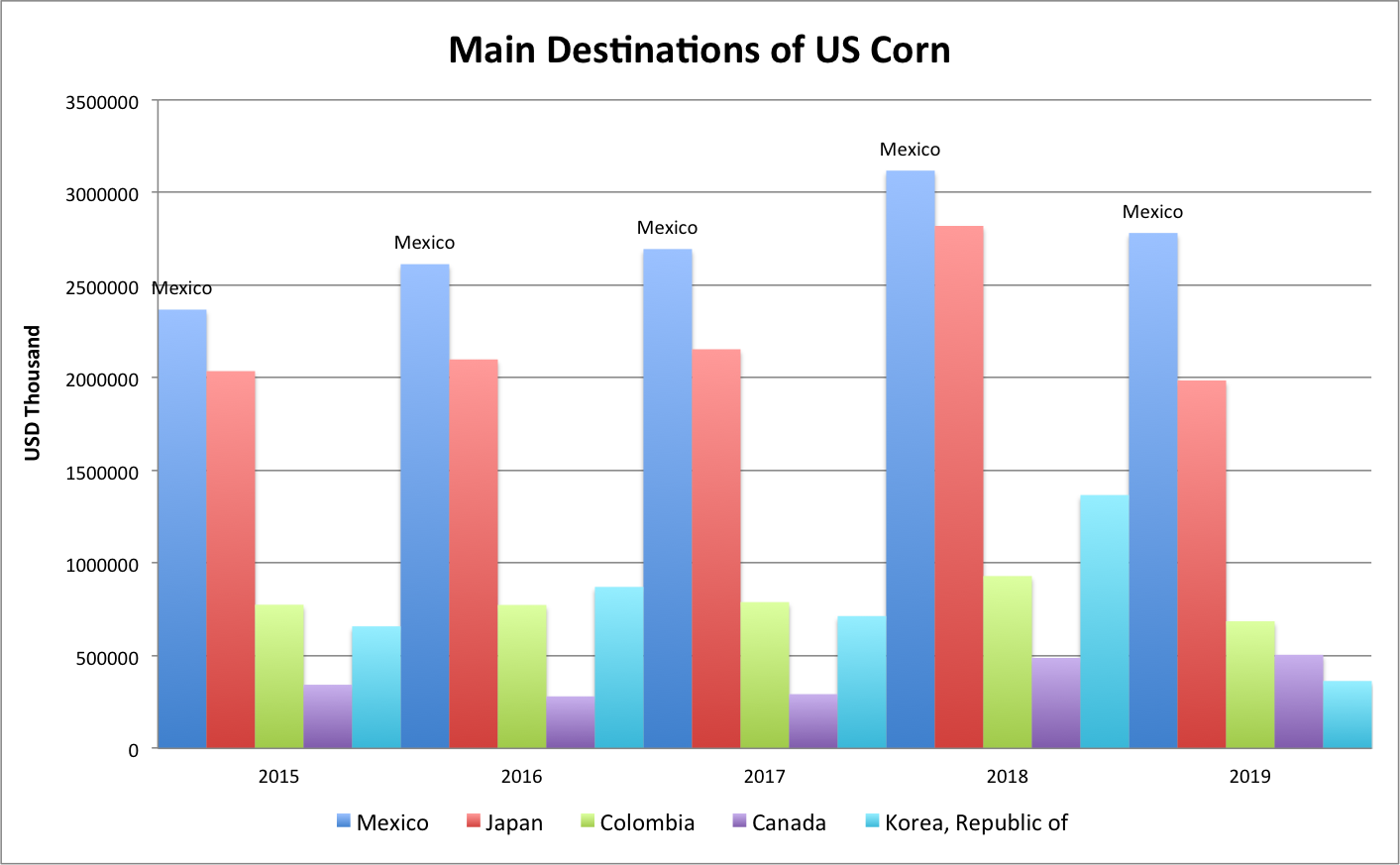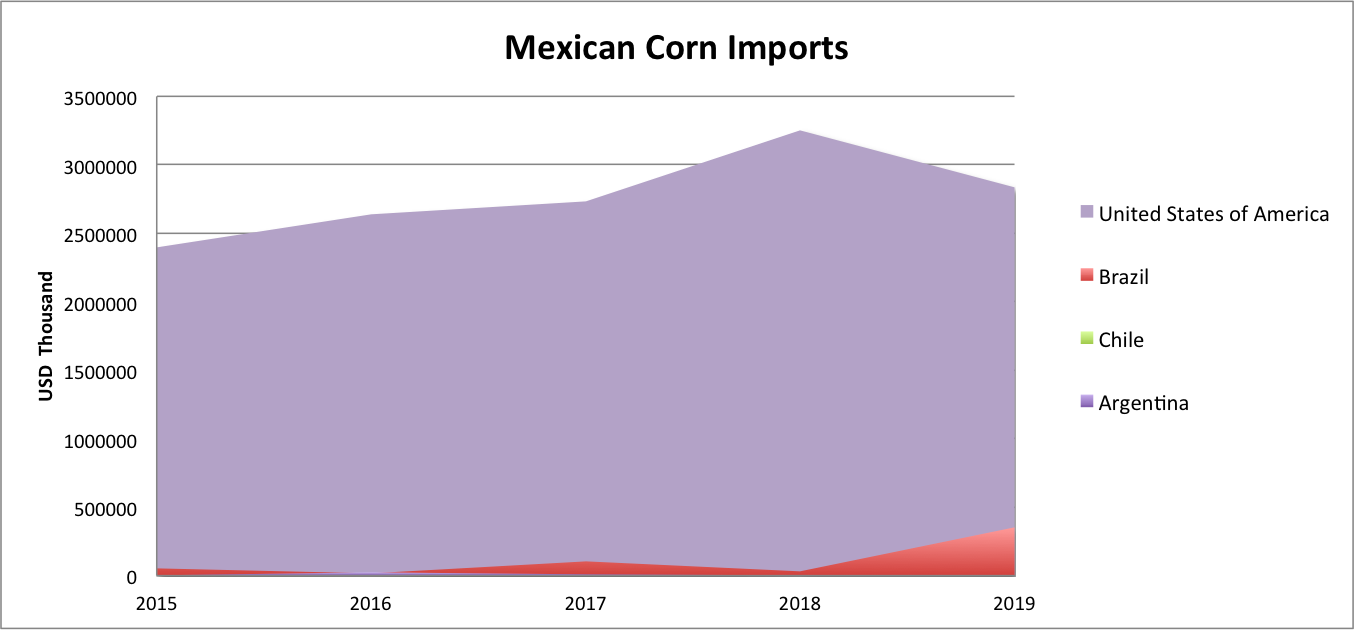US Corn Farmers Concerned about Mexico's GMO Ban
Mexican Government Announces a Phase Out to Ban GMO
The measure was implemented as a way to protect Mexico’s corn farmers from the flood of cheap imported corn that has undercut them since the implementation of the North American Free Trade Agreement in 1994.
The statement is part of the current government’s efforts to achieve self-sufficiency in food production and energy. The measure outlines that Mexico will "gradually substitute the use of genetically modified yellow corn and boost domestic production¨. The statement, however, did not detail the measures on how this will be achieved by 2024 and the range of products covered by the ban such as whether it will include livestock feed.
Opponents of GMO crops say they contaminate native varieties of corn and encourage the use of dangerous pesticides that endanger public health and harm biodiversity. GMO advocates such as the National Agricultural Council, however, claim that the prohibition of GMO corn cultivation will harm farmers while curbing imports will harm the Mexican food chain.
A Real Threat for US Corn Farmers
Mexico is a top destination for U.S. corn exports, bringing in about USD 2.7 billion in shipments in 2019. According to USDA data, the vast majority of exports is the yellow No. 2 variety typically used to make animal feed, and over 90% of U.S. corn is produced using genetically-modified varieties.

US exports hit record numbers in 2018 when it reached up to USD 3.1 billion in value, making corn the most valuable agro commodity imported in the country. Mexico is the top buyer of U.S. corn, accounting for 25% of U.S. corn exports, representing 4% of total annual U.S. corn production.
Corn imports into Mexico have grown a substantial 20% since 2012 as the Mexican food industry has increased its domestic production and have used the grain as a main source for their food process chains. This has caused US farmers to expand their production capacity. Restrictions on exports for the next 3 years and a complete ban by 2024 could carry significant damage to the US domestic production and a big risk of a sudden drop in the price.
An Unsustainable Measure for the Agrifood Business in Mexico
Mexico imported some 18 million tonnes of mostly GMO corn last season, around 40% of national consumption. The import of genetically modified grain from the U.S. is essential for many products in the agrifood chain. Mexico is largely self-sufficient in white corn used to make the country’s staple tortillas, but depends on imports of mostly GMO yellow corn from the United States for livestock feed.
Mexican ranchers and other users of imported corn are dependent on imports. While Mexico grows about 25 million tons of white corn, used in tortillas and other foods, every year, it imports about 18 million tons for cattle feed, starch, and other uses, most of it from the U.S. and nearly all of it genetically modified.

Nearly all of the available U.S. corn supplies, but also from rival producers in Argentina and Brazil, are genetically modified. That would make it nearly impossible to satisfy Mexican demand without GMO supplies if the decree applies for the cattle feed sector as well.
Mexico to Decide if GMO Corn Ban Will Apply to Animal Feed
Under the new rules, Mexico will revoke permits and stop issuing new ones for the release of GMO corn seeds for growers use. Mexico has always had a policy against GMO seeds for human consumption but about 30 import permits a year were granted for experimental purposes.
The Health Ministry's sanitary protection agency COFEPRIS issued 90 approvals for GMO corn used in human food and animal feed as of last year. Mexican law does not normally separate regulations on food for human or animal consumption.
Thus it is currently unclear whether the decree will phase out imported GMO corn for livestock, or whether the rules will apply only to corn grown for human consumption. Mexican officials will meet with producers to decide on whether a new ban on genetically modified corn will apply to animal feed.
Sources:
- ITC Trade Map. HS CODE 100590 Maize (excluding seed for sowing)
- Reuters. ¨Mexico farm lobby blasts ban on GMO corn; organic growers welcome it¨
- Bloomberg. “Mexico to Decide if GMO Corn Ban Will Apply to Animal Feed¨
Brownfield. ¨MEXICAN GMO CORN PHASE-OUT A CONCERN FOR US FARMERS¨
Food Processing. :¨Mexican Corn Users Decry GMO Ban¨


